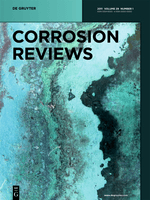
CORROSION REVIEWS
Scope & Guideline
Advancing the Science of Corrosion Management
Introduction
Aims and Scopes
- Corrosion Mechanisms and Theories:
The journal extensively covers the fundamental mechanisms of corrosion across different materials, including metals and alloys, focusing on the electrochemical processes, environmental interactions, and material degradation. - Corrosion Inhibition Strategies:
A significant portion of the journal is dedicated to exploring various corrosion inhibitors, including organic and inorganic compounds, natural extracts, and advanced materials such as nanocomposites, highlighting their effectiveness and mechanisms. - Material Performance in Corrosive Environments:
Research articles assess the corrosion behavior of materials in diverse environments, including marine, industrial, and acidic conditions, providing insights into material selection and protective measures. - Innovative Coating Technologies:
The journal emphasizes advancements in protective coatings, such as graphene-based and polymer coatings, detailing their synthesis, application, and impact on corrosion resistance. - Computational and Experimental Approaches:
The use of computational modeling and advanced experimental techniques is a core focus, allowing for the prediction of corrosion behavior and the evaluation of protective strategies. - Environmental Impact and Sustainability:
There is a growing emphasis on eco-friendly corrosion prevention methods, including the use of plant-based inhibitors and sustainable materials, aligning with global environmental goals.
Trending and Emerging
- Machine Learning and AI in Corrosion Research:
There is an increasing trend toward utilizing machine learning and artificial intelligence for modeling corrosion processes, predicting material behavior, and optimizing corrosion prevention strategies, indicating a shift towards data-driven approaches. - Green and Eco-Friendly Inhibitors:
Research on environmentally friendly corrosion inhibitors, particularly those derived from natural sources, is gaining momentum, driven by the need for sustainable practices in industrial applications. - Advanced Coating Technologies:
The development of innovative protective coatings, including nanostructured and multifunctional coatings, is trending, reflecting the demand for enhanced performance in corrosive environments. - Corrosion Behavior in Renewable Energy Applications:
Emerging studies focus on corrosion challenges in renewable energy systems, such as wind and solar energy, highlighting the need for robust materials that can withstand unique environmental conditions. - Hydrogen Embrittlement and Stress Corrosion Cracking:
There is a notable increase in research addressing hydrogen embrittlement and its mechanisms, particularly in critical applications like pipelines and aerospace, as industries seek to mitigate these risks.
Declining or Waning
- Traditional Inhibition Methods:
Research focusing solely on conventional corrosion inhibitors, such as heavy metals or specific synthetic chemicals, has seen a decline as more sustainable and eco-friendly alternatives gain traction. - Basic Corrosion Testing Methods:
The prevalence of basic corrosion testing methods without advanced analysis or novel approaches is decreasing, reflecting a shift towards more innovative and comprehensive testing methodologies that incorporate modern technology. - Corrosion in Non-Metallic Materials:
There appears to be a reduced focus on corrosion studies related to non-metallic materials or composites, with more research directed towards metals and alloys, possibly due to the increasing complexity and interest in metallic corrosion. - Localized Corrosion Studies:
While localized corrosion remains a critical area, the frequency of dedicated studies on specific forms such as pitting or crevice corrosion has diminished, as researchers integrate these topics into broader discussions of corrosion mechanisms. - Historical Corrosion Case Studies:
There is less emphasis on historical case studies of corrosion failures; instead, the focus has shifted to contemporary issues and cutting-edge research in corrosion prevention and material resilience.
Similar Journals
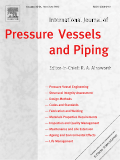
INTERNATIONAL JOURNAL OF PRESSURE VESSELS AND PIPING
Driving excellence in pressure vessel and piping scholarship.International Journal of Pressure Vessels and Piping, published by Elsevier Science Ltd, stands as a premier platform in the fields of Materials Science, Mechanical Engineering, and Mechanics of Materials. With a rich history spanning from 1973 to 2024, this journal has consistently ranked in the Q2 category of its respective fields, affirming its relevance and contribution to ongoing research and innovation. As evidenced by its solid positioning in Scopus rankings, including a notable 74th percentile rank in Mechanical Engineering, it is a valued resource for professionals, researchers, and students seeking to expand their knowledge on topics related to pressure vessels and piping systems. While the journal does not currently offer Open Access, its comprehensive articles and peer-reviewed research continue to make a significant impact, ensuring that readers stay informed of the latest advancements and methodologies in the industry. Available in both print and online formats, the International Journal of Pressure Vessels and Piping is your go-to source for authoritative insights and cutting-edge studies in the engineering domain.

Metals
Pioneering insights into the behavior and properties of metals.Metals is an esteemed open access journal published by MDPI, focusing on the diverse field of metallurgical science and its applications. Since its inception in 2011, the journal has provided a platform for the dissemination of high-quality research regarding the behavior, processing, and properties of metals and alloys. With an E-ISSN of 2075-4701, it has quickly established itself within the scientific community, achieving a remarkable Q1 ranking in the realm of Metals and Alloys and a Q2 rank in general Materials Science as of 2023. The journal is situated in Switzerland and is committed to the principles of open access, ensuring that findings are accessible to a broad audience without subscription barriers. With its notable impact factor and a strong emphasis on innovative research, Metals serves as an essential resource for researchers, professionals, and students seeking to advance their knowledge and understanding in the ever-evolving landscape of metallurgical studies.

RUSSIAN JOURNAL OF ELECTROCHEMISTRY
Fostering Knowledge in the Dynamic World of ElectrochemistryThe Russian Journal of Electrochemistry, published by Pleiades Publishing Inc, is a reputable scientific resource that caters to the dynamic field of electrochemistry. Since its inception in 1996, this journal has become a platform for the dissemination of cutting-edge research, exploring both foundational studies and innovative applications within electrochemical science. Despite currently holding a Q4 categorization in its field, the journal is dedicated to enhancing its scholarly impact and visibility, reflecting its commitment to fostering advancements in electrochemical technologies. With its ISSN 1023-1935 and E-ISSN 1608-3342, the journal strives to reach a global audience of researchers, professionals, and students alike. Though the journal is not open access, its contents are crucial for anyone looking to stay at the forefront of electrochemical research and developments. The journal's editorial board includes well-respected experts, ensuring that published articles contribute significantly to the scientific community and pave the way for future innovations in the field.

CORROSION ENGINEERING SCIENCE AND TECHNOLOGY
Empowering research to mitigate corrosion impacts.CORROSION ENGINEERING SCIENCE AND TECHNOLOGY is a pivotal journal dedicated to the exploration and advancement of corrosion knowledge and technologies, published by SAGE Publications Inc. This esteemed journal holds an ISSN of 1478-422X and an E-ISSN of 1743-2782, and is available for access in the United Kingdom and beyond. With a converged timeline from 2003 to 2024, it continues to publish high-quality research, fostering innovation in the fields of Chemical Engineering, Chemistry, and Materials Science, currently ranked in the Q3 quartile in these categories as of 2023. Additionally, the journal's Scopus rankings—211th in General Chemistry, 145th in General Chemical Engineering, and 266th in General Materials Science—underscore its commitment to disseminating impactful research. As an open-access journal, it invites researchers, professionals, and students to engage with cutting-edge developments in corrosion science, offering insights and solutions critical to numerous industries and enhancing collective academic understanding.
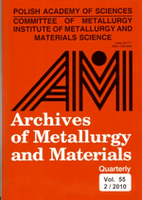
ARCHIVES OF METALLURGY AND MATERIALS
Championing Open Access to Materials Science InsightsArchives of Metallurgy and Materials is a prestigious open-access journal published by the Polish Academy of Sciences, Institute of Metallurgy and Materials Science. With its ISSN 1733-3490 and E-ISSN 2300-1909, this journal has been a critical resource for researchers and professionals in the field of materials science since its establishment in 2004. The journal focuses primarily on advancements in metals and alloys, contributing to the growing body of knowledge in this dynamic and evolving discipline. As acknowledged in the 2023 Scopus rankings, it currently holds a Q3 category in both Metals and Alloys with a rank of #117 out of 176 journals, indicating its commitment to quality research despite being relatively young in the indexing landscape. With its open-access policy initiated in 2010, the journal aims to enhance the dissemination of scientific findings and encourage collaboration among the global materials science community. Researchers, students, and industry professionals are invited to explore the valuable insights and innovations showcased within Archives of Metallurgy and Materials, contributing to the advancement of material technologies and applications.
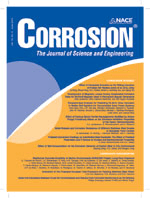
CORROSION
Pioneering Research in Corrosion and Materials ScienceCORROSION is a prestigious journal published by the Natal Association of Corrosion Engineers, dedicated to advancing the understanding of corrosion phenomena in various materials across multiple industries. With a strong commitment to high-quality research, it has established itself as a key resource in the fields of Chemical Engineering, Chemistry, and Materials Science, as reflected in its Q3 ranking in the 2023 category quartiles. This journal, retaining its relevance since 1969, serves as a platform for innovative studies and findings that address fundamental and applied aspects of corrosion, vital for professionals engaged in material selection and integrity management. Through access to state-of-the-art research, CORROSION significantly contributes to the safety, sustainability, and efficiency of engineering practices worldwide. Researchers, professionals, and students alike can benefit from the insights offered by this journal, driving forward the quest for innovative solutions in corrosion management.

Corrosion Science and Technology-Korea
Empowering researchers to enhance materials longevity.Corrosion Science and Technology-Korea, published by the CORROSION SCIENCE SOC KOREA, is a pivotal journal dedicated to the exploration and advancement of knowledge in corrosion science, particularly within the context of materials performance and maintenance. Established to foster innovation and collaboration among scholars in South Korea and beyond, this journal focuses on areas such as electrochemistry, metal alloys, and surface coatings, catering to a diverse audience of researchers, professionals, and students in materials science and chemistry. Despite its current quartile rankings, including Q4 in Electrochemistry and Q3 in various materials-related categories, the journal aims to enhance its visibility and impact in the scientific community by publishing high-quality research and reviews. With its ISSN 1598-6462 and E-ISSN 2288-6524, Corrosion Science and Technology-Korea is committed to contributing to the understanding and mitigation of corrosion issues, thereby promoting sustainability and longevity in engineering applications.
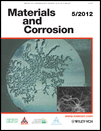
MATERIALS AND CORROSION-WERKSTOFFE UND KORROSION
Unveiling the Secrets of Material DurabilityMATERIALS AND CORROSION-WERKSTOFFE UND KORROSION, published by WILEY-V C H VERLAG GMBH, stands as a pivotal resource in the fields of materials science and engineering. Established in 1950, this peer-reviewed journal publishes innovative research that advances our understanding of materials performance and degradation in various environments. With a commendable impact factor and notable rankings in several categories—including Q2 in Materials Chemistry and Mechanical Engineering—the journal attracts submissions from leading researchers worldwide. It encompasses a diverse range of topics related to metals, alloys, surfaces, coatings, and environmental impacts, thereby serving a broad audience of scholars and professionals. The journal offers both subscription and Open Access options, ensuring that significant research findings are readily available to all. With its commitment to fostering knowledge and collaboration, MATERIALS AND CORROSION plays a crucial role in addressing the evolving challenges in material science and corrosion management.
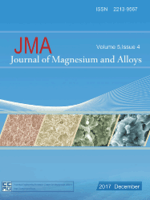
Journal of Magnesium and Alloys
Leading the Charge in Alloy AdvancementsThe Journal of Magnesium and Alloys is a prestigious, peer-reviewed academic publication dedicated to advancing the field of materials science, particularly focusing on magnesium and its alloys. Published by KEAI PUBLISHING LTD since 2013, this Open Access journal enables unrestricted dissemination of research findings, enhancing global collaboration among researchers, professionals, and students. With an ISSN of 2213-9567 and a significant impact factor, it has established itself in the upper quartiles (Q1) of both the Mechanics of Materials and Metals and Alloys categories, ranking #3 out of 176 and #9 out of 398 respectively according to Scopus. The journal aims to provide a forum for the latest advances in the understanding, production, and application of magnesium alloys, fostering innovation and sustainable practices within the materials engineering community. Based in Beijing, China, the journal is committed to bridging gaps in current knowledge and driving future research directions through its high-quality publications.

Ochrona Przed Korozja
Fostering Insights in Materials ChemistryOchrona Przed Korozja is a pivotal journal dedicated to advancing the understanding and application of corrosion protection, a critical area within the realms of Chemical Engineering, Materials Chemistry, and Metals and Alloys. Published by WYDAWNICTWO SIGMA-NOT SP ZOO in Poland, this journal seeks to provide a comprehensive platform for researchers and professionals to share innovative findings, methodologies, and technologies related to corrosion prevention and management. With an ISSN of 0473-7733 and E-ISSN 2449-9501, the journal features articles that contribute to the scientific community, despite its current Q4 ranking across several relevant categories as of 2023. As it converges through the years 2019 to 2024, Ochrona Przed Korozja plays an essential role in fostering discourse and dissemination of knowledge in its niche, although it currently lacks open access options. Researchers, students, and industry professionals are encouraged to engage with the impactful content, promoting a deeper understanding of corrosion and its prevention in various practical applications.